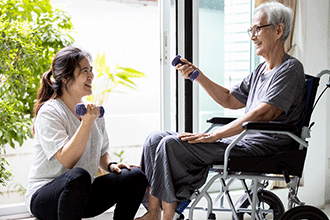How can exercise improve cognitive performance?

It’s common knowledge that regular exercise helps you build and maintain your physical health. Several studies have found that regular aerobic exercise can also improve brain health and aid in cognitive function. These results include people who are already experiencing cognitive decline.
Cognitive health describes a person’s ability to think, learn and remember. These skills are critical for performing everyday tasks.
While stamina and strong muscles are a nice perk of working out, your brain and cognitive health also get some serious benefits, especially during child development and the aging process.
Importance of cognitive health
Cognitive skills help you complete activities that you often take for granted as “simple tasks.” For example, remembering where you put your car keys is a cognitive task. So is memorizing the route to your nearest grocery store or recognizing your car in a parking lot.
Cognitive function is a characteristic of brain health that allows you to take new and existing information and use it to get through each day.
Other aspects of brain health include:
Tactile function – The ability to feel and respond to pressure, pain, temperature and other touch sensations.
Motor function – The ability to initiate and control movements and maintain balance.
Emotional function – The ability to read and respond to positive and negative emotions.
It’s important to develop all these facets of brain health during childhood and strengthen them as you age to remain mentally sharp throughout your life.
Childhood development
Children’s brains continue to grow and change into adulthood. However, the first eight years of life prepare the brain for health, learning and academic success. How the brain develops relies on a child’s experiences with their environment and the people around them.
Researchers behind a 2020 study in the Journal of Aging and Health examined the relationship between positive childhood experiences and cognitive function. Results suggest that children who grow up in a “happy family” show higher levels of cognitive functioning.
According to that 2020 study, people who reported a happy family life during childhood were also most likely to have:
Exposure to positive emotions (like happiness) as a child
Encouragement as a child to learn and socialize
Parents who were responsive, open and emotionally supportive
Parents with high education levels
Lack of financial hardship experienced growing up
A child’s cognitive development can also be promoted by providing:
Proper nutrition and stimulation
A loving and stable environment
Talking to and playing with a child — even if they’re too young to respond — supports healthy brain growth. Children get the most out of learning when they’re raised in a safe environment, free of stress or neglect.
SEE RELATED: Your baby: Infant vision development timeline
Effects of aging
As people age, their brain health can be affected by several factors, including:

Age-related changes (brain shrinkage, which can cause memory loss and communication issues)
Disease (Alzheimer’s disease or vascular injury to the brain)
Mood disorders (depression)
Substance abuse (addiction)
Injuries (stroke)
Not all these issues can be reversed or prevented. However, practicing certain habits can help slow the effects of aging on cognitive health. Here are some ways to protect your cognitive health as you age:
Manage your blood pressure – High blood pressure is linked to brain atrophy and volume loss of brain matter.
Maintain your physical health – Regular checkups, eye exams and other routine health visits are important. This includes managing existing conditions and quitting smoking.
Eat healthy foods – Doctors recommend a diet full of fruits, vegetables, whole grains and lean meats. And make sure to drink plenty of water.
Manage your stress – Stress raises blood pressure, and can increase your risk of Alzheimer’s disease. Practice stress management techniques like meditation and yoga to help work through everyday stressors. [Read more about how stress can affect your vision.]
Stay social – Community programs are often available if you don’t already have an established social group. Building and maintaining a group of friends is good for keeping your brain healthy.
Get active – Physical activity can help manage stress and lower blood pressure, among other benefits. Research suggests that higher levels of physical activity are associated with better cognitive performance.
Keep your mind sharp – A 2020 study found an association between better cognitive function and participation in a wide variety of leisure activities throughout one’s life. Activities ranged from playing games and visiting museums to reading and writing.
SEE RELATED: How vision changes as you age
Ways exercise improves cognitive health
Exercising can help children and older adults develop, maintain and improve their cognitive health and function.
Studies of children in five countries measured their physical activity as well as their cognitive development. Results found that longer and more frequent periods of physical activity were more beneficial to children’s cognitive health. Studies like this suggest that exercise is important to cognitive development in children.
Similarly, older adults who engage in physical activity have higher cognitive functioning than adults who do not. Other studies have also suggested that higher levels of physical activity are linked to a slower rate of cognitive decline.
But what is it about exercise that actually improves cognitive health? Physical activity can increase blood flow to the brain and lower stress hormone levels. Regular physical exercise can help the brain stay happy and protect it from symptoms of aging.
Eye health
The eyes and the brain rely heavily on each other for vision to work successfully. Attached at the back of each eyeball is the optic nerve.
Optic nerves work as messengers, taking the visual messages created by the retina, and sending them to the brain. Once these impulses reach the brain, they’re turned into images.
Because the eye-brain connection is so strong, what affects one is likely to affect the other. For example, if exercise can protect or improve cognitive health, it may also protect your eyes and vision.
Some of the most common eye conditions experienced by older adults are glaucoma, diabetic retinopathy (DR) and age-related macular degeneration (AMD). Studies have linked physical activity to a lower risk of developing glaucoma, DR and AMD. In the case of dry eyes, exercise may actually provide relief.
Glaucoma – Glaucoma occurs when your internal eye pressure is high enough to damage the optic nerve. A study involving men and women between the ages of 40 and 81 found that being physically fit significantly lowered the risk of glaucoma incidence.
Diabetic retinopathy – DR occurs when increased blood sugar levels damage the retina. Research shows that a sedentary lifestyle can increase a person’s risk of developing diabetic retinopathy. It also suggests that physical activity works as a protective measure against it, especially the vision-threatening aspect of it.
Age-related macular degeneration – AMD occurs when cells in the macula begin to break down, or when abnormal blood vessels begin to grow on the retina. A 2014 study that compared adults aged 75 and older found that the most physically active adults were 79% less likely to experience AMD than the least physically active.
SEE RELATED: What part of the brain controls vision?
Improved blood flow to the brain
Exercise increases blood flow throughout the body, including the lungs, muscles and brain.
Mild cognitive impairment can be linked to poor blood flow to the brain and stiffened blood vessels that lead to the brain. It’s thought that increasing brain blood flow by exercising may help “wake up” the sluggish blood flow and stiffened blood vessels.
To test this idea, a UT Southwestern study measured exercise and brain blood flow. People who exercised regularly showed an increase in blood flow and less blood vessel stiffness. This suggests that exercise may have promising effects on cognitive health.
SEE RELATED: 8 tips for home workouts with Team Oakley
Lowering stress hormone levels
The thought of getting on a treadmill may not seem like a way to de-stress. But regular exercise is an important part of stress management.
When you get stressed, your brain releases several stress hormones. The three main stress hormones are cortisol, adrenaline and norepinephrine. Originally, these hormones helped mammals respond to dangerous situations.
The hormones humans originally needed to escape from a chasing bear are now released when they get stuck in traffic. Overreaction to non-life-threatening stressors can have a long-term effect on the body and the brain.
During exercise, cortisol is also released. But this cortisol doesn’t have the same chemical makeup as stress-related cortisol. In fact, the release of exercise-induced cortisol “intensely suppresses” the stress-related cortisol.
After 30 minutes of vigorous exercise, there was also reduced reactivity in the gland that releases stress hormones. So, not only does exercise reduce your stress levels, but it helps lower your reactivity to stress. This can help manage stress and protect cognitive health.
The takeaway
Incorporating regular exercise into your life has many health benefits. If you have physical limitations, such as weakened knees, hips or shoulders, talk to your doctor about different options for staying active.
Making an effort to get or stay in shape as you age will ensure your heart, mind and vision stay healthy.
READ MORE: Do eye exercises improve vision?
Cognitive health and older adults. National Institute on Aging. October 2020.
The influence of exercise on cognitive abilities. Comprehensive Physiology. January 2013.
23 examples of cognitive skills. Helpful Professor. December 2020.
Early brain development and health. Centers for disease control and prevention. February 2021.
Are positive childhood experiences linked to better cognitive functioning in later life?: Examining the role of life course pathways. Journal of Aging and Health. November 2020.
Ageing and the brain. Postgraduate Medical Journal. February 2006.
Physical activity and motor ability associated with better cognition in older adults, even with dementia. National Institute on Aging. April 2019.
Differences in association of leisure time activities and cognition in a racially/ethnically diverse cohort of older adults: Findings from the KHANDLE study. Alzheimer's & Dementia: Translational Research & Clinical Interventions. June 2020.
Vision health associated with cognitive health. Healio. July 2019.
Longitudinal associations between visual impairment and cognitive functioning. JAMA Ophthalmology. September 2018.
Correlation between vision and cognitive function in the elderly. Medicine (Baltimore). January 2016.
Systematic review of physical activity and cognitive development in early childhood. Journal of Science and Medicine in Sport. July 2016.
Relationship between physical activity and cognitive functioning among older Indian adults. Scientific Reports. February 2022.
Does physical activity prevent cognitive decline and dementia?: A systematic review and meta-analysis of longitudinal studies. BMC Public Health. May 2014.
Exercise boosts blood flow to the brain, study finds. UT Southwestern Medical Center. March 2021.
Understanding the stress response. Harvard Health Publishing. July 2020.
The effects of exercise intensity on the cortisol response to a subsequent acute psychosocial stressor. Psychoneuroendocrinology. September 2021.
Physical activity, cardiorespiratory fitness, and incident glaucoma. Medicine & Science in Sports & Exercise. November 2018.
Physical activity and risk of diabetic retinopathy: A systematic review and meta-analysis. Acta Diabetol. August 2019.
Age-related macular degeneration (AMD). Johns Hopkins Medicine. Accessed March 2022.
Physical activity and the 15-year incidence of age-related macular degeneration. Investigative Ophthalmology & Visual Science. December 2014.
Page published on Wednesday, April 20, 2022
Page updated on Tuesday, April 19, 2022
Medically reviewed on Monday, March 28, 2022






